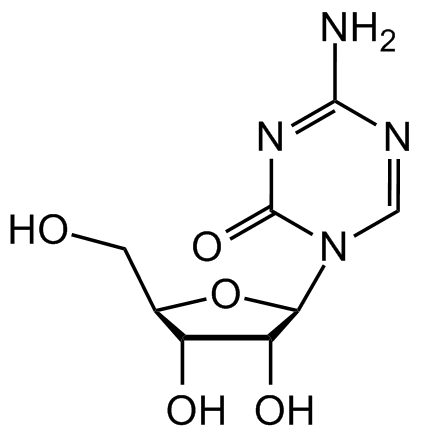
Chemical Structure
5-Azacytidine [320-67-2]

CDX-A0271
CAS Number320-67-2
Product group Chemicals
Estimated Purity>98%
Molecular Weight244.2
Overview
- SupplierChemodex
- Product Name5-Azacytidine [320-67-2]
- Delivery Days Customer10
- CAS Number320-67-2
- CertificationResearch Use Only
- Estimated Purity>98%
- Hazard InformationDanger,Non-hazardous
- Molecular FormulaC8H12N4O5
- Molecular Weight244.2
- Scientific Description5-Azacytidine, a chemical analogue of the DNA and RNA nucleoside cytidine, is an cell permeable inhibitor of DNA methyltransferases, potentially serving to reverse epigenetic changes. It reduces hypermethylation associated with certain diseases, including myelodysplastic syndromes (IC50s = 2.4 and 2.6microM for in vitro anti-myeloma activity) and cancer (IC50s ~ 0.4microM for inhibiting proliferation of various cancer cell lines). It has a reported half-life of 17 hours and is considerably cytotoxic; it must be incorporated into DNA to covalently trap DNA methyltransferases. Induces demethylation and reactivation of silenced genes. Improves the efficiency of reprogramming of stem cells; induces differentiation of mesenchymal stem cells into cardiomyocytes. - Chemical. CAS: 320-67-2. Formula: C8H12N4O5. MW: 244.2. Synthetic. 5-Azacytidine, a chemical analogue of the DNA and RNA nucleoside cytidine, is an cell permeable inhibitor of DNA methyltransferases, potentially serving to reverse epigenetic changes. It reduces hypermethylation associated with certain diseases, including myelodysplastic syndromes (IC50s = 2.4 and 2.6microM for in vitro anti-myeloma activity) and cancer (IC50s ~ 0.4microM for inhibiting proliferation of various cancer cell lines). It has a reported half-life of 17 hours and is considerably cytotoxic; it must be incorporated into DNA to covalently trap DNA methyltransferases. Induces demethylation and reactivation of silenced genes. Improves the efficiency of reprogramming of stem cells; induces differentiation of mesenchymal stem cells into cardiomyocytes.
- SMILESOC[C@@H]1[C@@H](O)[C@@H](O)[C@H](N2C=NC(N)=NC2=O)O1
- Storage Instruction2°C to 8°C,-20°C
- UNSPSC12352200
